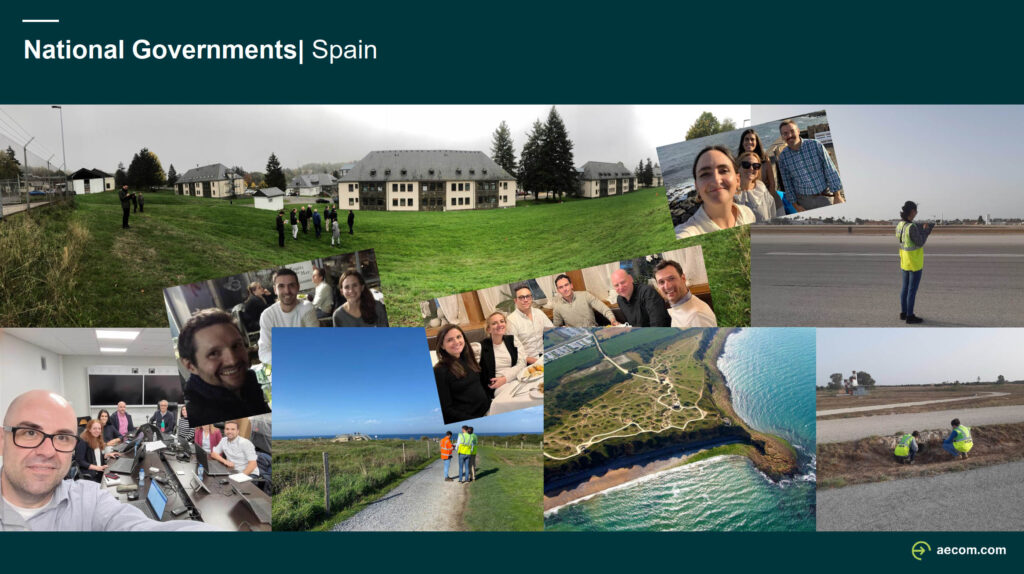People Spotlight: Meet Almudena Carro
Our People Spotlight series gives you an inside look at our technical experts around the world. This week, we are highlighting a national security leader from our Buildings + Places (B+P) business line in Spain and providing you insight into their business development inspiration and work.
Almudena Carro leads the Defense sector in Spain across three business lines and is based in AECOM’s Madrid office. Her work focuses on providing a full range of multidisciplinary services delivering infrastructure solutions to the U.S. Department of Defense, ABMC (American Battle Monuments Commission) and NSPA (NATO Support and Procurement Organization) in collaboration with other AECOM’s offices in the U.S., UK and continental Europe.
Tell us about what inspired you to join the industry.
After finishing my master’s degree in architecture, I joined a small architectural practice in Madrid. I was keen to gain more experience in interdisciplinary design coordination throughout the project lifecycle, so I joined an engineering firm, where I worked as an architect and project manager for almost six years. This role gave me the opportunity to engage with clients from early stages to building operation.
I joined AECOM eight years ago to grow my skills and understanding of large-scale international projects and to be part of a global multidisciplinary team. I really value the wide range of projects and clients we work for, plus the collaboration across offices and disciplines. I am always eager to expand my knowledge. I relish the professional challenges that open my mind to new facts or information, understanding people and learning about cultures, other ideas and other ways of doing things.
What is your favorite AECOM project that you’ve worked on and why?
It’s extremely difficult to pick just one, because each project has had a huge impact in my learning path and my career progression—from the first one for B+P in Azerbaijan to all different buildings in diverse locations I have been working in.
I enjoy working on DoD projects because I feel like I’m continuously learning new things about clients and about our capabilities. I’m thrilled to discover new skillsets and subject matter experts across our different regions and collaborating with them to solve our client’s challenges.
Working on the U.S. Department of Defense programs was challenging at the beginning, because it entailed considering U.S. and host nation codes and assessing our client on how to combine both. The collaboration across all offices in continental Europe has allowed our teams to gain experience, advise our clients and to improve our designs. Teams integrating the best capabilities from each office and treating the projects as programs instead of as independent elements have been two factors crucial for the growth of our DoD business in continental Europe.
Moreover, working for DoD programs has offered me and the team in Spain the chance to collaborate on and learn about the specialisms that were not that well known to us a few years ago: cybersecurity, physical security, anti-terrorism force protection, value engineering and cost and schedule risk assessment airfield pavements, planning, and more.
I work with the expectation that the next project will be even better than the previous one, I am really looking forward to developing my relationship with current clients and working with new ones.
Tell us a story of how your work positively impacted the community.
I had the opportunity to lead the preparation of a Holistic Accessibility Plan for one of the main universities in Madrid. The project covered two campuses including more than 35 buildings.
The goal of the project was to provide the university with a strategy for the improvement of accessibility for their buildings and environment. We started by conducting detailed research on the current status of the buildings and followed that by proposing corrective actions per building and area. The proposal included concept designs, typical details and a schedule for the deployment of the corrective actions.
A wide approach was put in place, making all outdoor areas and buildings accessible not only for people with mobility issues, but many other ability factors were considered, including sight, hearing and aging.
Analyzing the situation of each facility and proposing new designs for improving the wayfinding and accessibility allowed me to learn a lot about diverse capabilities, which was not a key driver for designers at that time in Spain. New designs included ramps, elevators, refurbishments and adaptations of staircases, toilets, reception desks, and the full redesign of the signage and wayfinding systems across each building and external areas. With a small team and a lot of enthusiasm, we tackled this challenge and enjoyed the journey.
The project was key to making the university campus more inclusive and ensuring that everyone had the same opportunities and access to learning.
Share a piece of career advice.
Be curious and open to learning all the time. Do ask questions if you do not understand something. Most of the time you will discover that many other people had the same queries, but they were not brave enough to raise the question. There are a lot of people and colleagues eager to share their knowledge and experience, they will be glad to help you.
Be honest with yourself and with others (but polite, there is always a respectful way to express your views) and never commit to something you don’t believe in.







